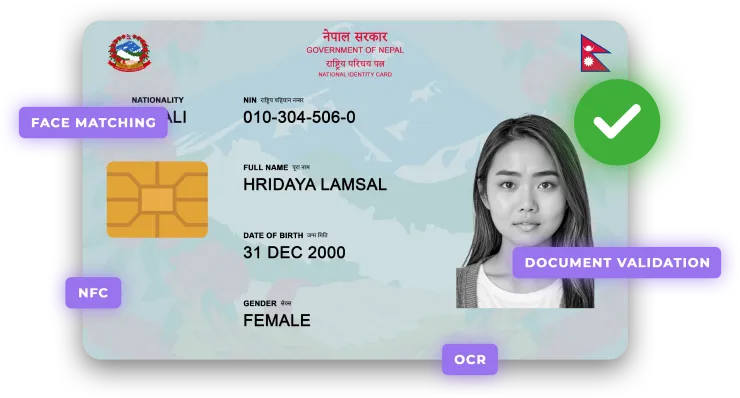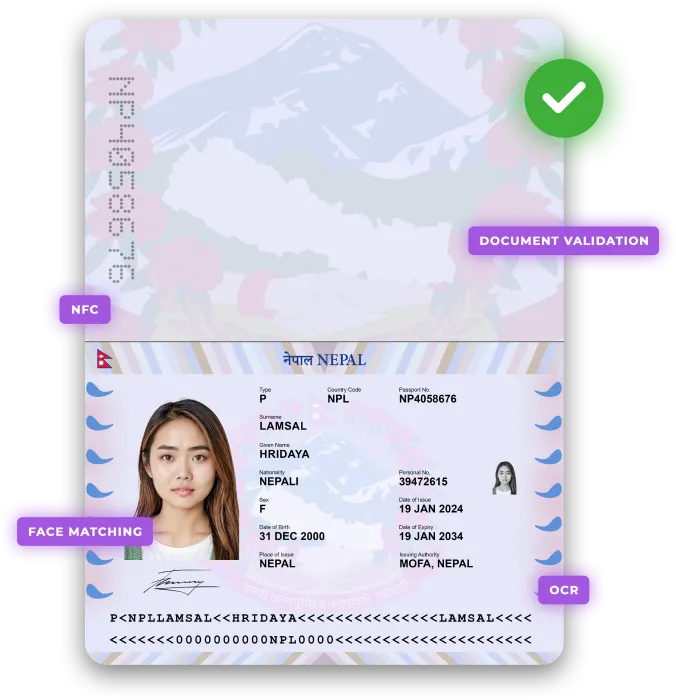COVERAGE
Compliance You Can Count On in Nepal
Designed for Nepal’s local laws and financial standards, our platform ensures businesses can comply confidently, reduce risks, and operate with integrity.

Trusted by 1,700+ clients globally









Who are the regulators in Nepal?
Nepal Rastra Bank (NRB)
As Nepal’s central bank, NRB manages monetary and foreign exchange policies, ensures financial sector stability, and supervises banks and other financial institutions.
Financial Intelligence Unit (FIU-Nepal)
An independent unit within NRB, FIU-Nepal collects, analyzes, and shares financial intelligence on suspected money laundering and terrorist financing with law enforcement agencies.
Department of Money Laundering Investigation (DMLI)
DMLI investigates money laundering and terrorism financing cases, enforcing laws, seizing assets, and securing convictions to combat financial crimes.
Securities Board of Nepal
Serves as the primary regulator of Nepal’s securities market, implementing regulations and preventing financial crimes such as insider trading.
Ministry of Finance
The Ministry of Finance coordinates AML/CFT policies across government bodies, ensuring a unified approach to preventing money laundering and terrorist financing in Nepal.
Who is regulated in Nepal?
Financial Institutions (FIs)
Who are classified as FIs?
Banks
Development Banks
Finance Companies
Microfinance Institutions and Cooperatives
Payment Service Providers
Designated Non-financial Businesses and Professions (DNFBPs)
Who are classified as DNFBPs?
Real Estate Agents
Precious Metal Dealers
Lawyers
Auditors
Accountants
Expectations for regulated firms
Firms must apply a risk‑based approach, perform Customer Due Diligence (CDD), verify beneficial owners, monitor transactions and file Suspicious Transaction Reports (STRs) to FIU‑Nepal
Enhanced Due Diligence (EDD) is required for higher‑risk relationships, and reporting entities must maintain internal controls, governance frameworks and training programmes.

AML/KYC Checklist for Nepal
- Verify identity of natural or legal clients; identify and assess beneficial owners.
- Conduct risk profiling (PEPs, sanctions exposure, geography, product/channel risk) and apply EDD where required.
- Retain records of CDD and screening for the statutory retention period; submit STRs promptly to FIU‑Nepal.
Supervision & Enforcement
The NRB’s Money Laundering Prevention Supervision Division inspects licensed institutions, conducts off‑site surveillance and enforces AML/CFT compliance through sanctions.
The FIU‑Nepal receives STRs, analyses data, disseminates intelligence to law‑enforcement or supervisory bodies and enforces reporting obligations (including fines for non‑submission).

Supported ID documents from Nepal
National ID
Idenfo can verify the Nepali National ID, issued by the National ID and Civil Registration Department, ensuring accurate data matching and full compliance with Nepalese regulatory requirements.
Document Verification
- Evaluates document quality by checking for glare or blur.
- Identifies any signs of tampering or forgery within the document.
- Confirms the authenticity of hologram prints.
- Extracts key data using optical character recognition (OCR).
NFC Scanning
- Reads data from the identity card's NFC chip.
- Verifies the NFC chip data for integrity and authenticity.


Nepali Passport
Idenfo verifies Nepali passports issued by the Department of Passports, confirming the holder’s name, date of birth, and contact details as part of Enhanced Due Diligence for KYC in Nepal.
Document Verification
- Evaluates document quality by detecting glare or blur.
- Identifies potential tampering or forgery.
- Verifies the document’s format for accuracy.
- Cross-checks data against the MRZ code and hologram.
NFC Scanning
- Reads data from the passport's NFC chip.
- Verifies the NFC chip data for integrity and authenticity.
How it works

Document Capture
Scan and extract key identity details from official documents.

Liveness Check
Ensure the person is real and matches their verified ID photo.

Data Verification
Cross-check personal details against trusted government sources.

Risk Screening
Assess AML and sanctions risks before onboarding customers.

User Authentication
Simplify returning logins with secure biometric authentication.